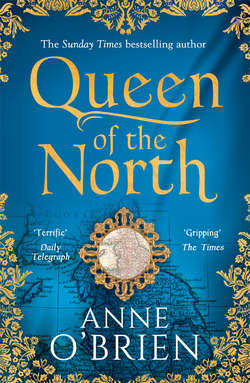Читать книгу Queen of the North: sumptuous and evocative historical fiction from the Sunday Times bestselling author - Anne O'Brien, Anne O'Brien - Страница 11
ОглавлениеPrologue
Alnwick Castle: Spring 1399
I lifted my daughter Bess high into my arms, so that she could see over the stone coping of the parapet.
‘Don’t wriggle,’ I said. Without noticeable effect.
We were standing at the highest vantage point of the barbican, bold in its crenellations, our various hair and veils and enveloping cloaks straining against the constant breeze from the north-west. In my memory it was always autumn or winter at Alnwick, whatever the month decreed, and even now in my maturity it was a cold place. The sable lining of my cloak felt chill, like a cold cat, against my throat.
We had been ordered here to the barbican by the command of the Earl, a man as unbending as the wind that harried us. Three generations of the mighty Percy family hemmed me in, three generations of darkly red-haired power, now glowing mahogany under the noonday sun. Henry Percy, Earl of Northumberland, my father by law. Sir Henry Percy, his son and heir and my husband. Henry Percy, my son, aged five, more interested in the ants’ nest beneath the stones than the spread of acres on all sides. All Henrys. All long-limbed with the musculature of a soldier. All blessed, or cursed some would say, with a driving ambition for power. Even my son, growing in fine Percy style, was directing the ants in a path of his choosing with a strategic pile of pebbles.
The Earl’s arm swept in an expansive gesture to match his gaze, taking in all to be seen. To the east, the wooded pastures in the direction of the sea and Warkworth, another Percy stronghold. South across the deep ravine towards the benign reaches of England. West where the March stretched to the further coast, far beyond our sight. And then north, across the great bailey and the formidable towers of our home, across the River Aln, to the threat of the darker hills of Scotland and a darker marauding Scottish power, for here in the northern March the Scots were our enemy.
‘This is ours,’ the Earl said, voice clear enough though beginning to crack with age and much bellowing across Scottish battlefields. Now it disturbed a pair of roosting jackdaws that lifted into the wind with their sharp repetitive cries. ‘Every acre, every tree, every sod of earth. All fought over and won. We will hold it, and more, until the Day of Judgment, when all earthly things come to an end.’
‘As long as the King of England allows it,’ I said, my eye on my son who had abandoned the ants and begun to climb dangerously. Lowering Bess to her feet, I kept her hand clasped in mine; she was too young at four years for these excursions to the windswept heights to witness our greatness. True, these Percy lords were Wardens of the East and West March in the north, guarding England against Scottish incursions, but such office was dependent on the favour of the King of England. What was given with a generous hand could be taken away by one dripping with malice, or simply a desire to reward a different lord. Our King was known for his unpredictability.
‘We have a right to it.’ The Earl was unimpressed by any comment I might make on royal limitations on our northern supremacy.
‘As long as Ralph Neville gains no more power at our expense.’ Sir Henry leaned, elbows sharp against the wall, looking west in the direction of Raby Castle where Ralph Neville, Earl of Westmorland, sat and probably gloated over his growing power. ‘Our King is inclined to favour him.’
‘Our King is sometimes a royal fool.’ The Earl turned his back on Raby, narrowing his eyes against the sun, thus summarily dismissing King Richard. He sniffed. ‘There is change in the air.’
‘For good or ill?’ I asked, in no manner cowed by the previous rebuff.
‘For good. Always for good.’ His eyes rested on me, surprising me with their speculation, as if some thought had lodged in his mind to which I was not privy. There were always plots and stratagems in the Earl’s mind to which I was not privy. ‘There will be no challenge to our power, Elizabeth. Are we not Kings of the North?’
‘We’ll be frozen Kings of the North if we remain here much longer.’ Sir Henry tucked our daughter under one arm and, with his free hand, led me down the narrow stair to the busy bailey in the wake of our son.
Kings of the North.
Indeed we were, for there was no real challenge to Percy hegemony. I was Elizabeth Mortimer, of royal descent; wife of Sir Henry Percy, heir to the Earl of Northumberland. Sir Henry Percy whom the Scots, in their wisdom, their admiration and their fear on the battlefield, called Hotspur. One day, when the Earl’s earthly days came to an end and Sir Henry took ownership of the cushioned chair at the head of the Percy deliberations, I would be Queen over these northern acres.
